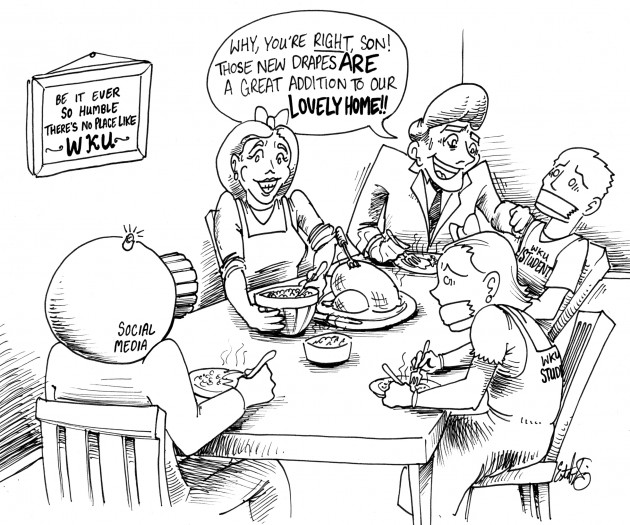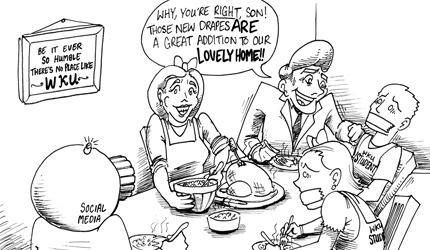
If you’re a student at Western Kentucky University, you criticize your school using social media and the university doesn’t like it, tough luck.
Western Kentucky has come under scrutiny for its social media policy, which could lead to students being disciplined for saying disparaging marks about the university.
The student handbook reads “accessible communications deemed inappropriate may lead to disciplinary action.”
Western Kentucky’s student newspaper, the College Heights Herald, highlighted the policy after the university asked Twitter to shut down an account called @PimpRansdell, which parodied university president Gary Ransdell.
After the account’s founder made adjustments to the account, including uploading a new photo that censored Ransdell’s face and changing the description to say “This is a parody account. Not affiliated with Dr. Ransdell or WKU,” the account was reactivated.
While the university said the account was deactivated for trademark infringement and not the fact that it was a parody site, the account was still shut down as part of Western Kentucky’s efforts to monitor its students’ social media usage.
We question Western Kentucky’s stance on social media and believe it could set a restrictive precedent for students. It could even be unconstitutional.
Adam Goldstein, attorney advocate with the Student Press Law Center, told the Herald that Western Kentucky’s policy violates the Constitution and cannot be enforced as long as Western Kentucky is a public university.
“As long as the word ‘inappropriate’ is there, that just means we’re going to punish whatever we don’t like, and as the government you positively cannot do that ever,” Goldstein said.
Regardless of the constitutionality of Western Kentucky’s social media policy, such a policy defeats one of the purposes of college. Students are supposed to think critically, and sometimes that involves criticizing one’s own institution in hopes of enacting change.
At Baylor, we acknowledge we attend a private university and could be subject to restrictive social media policies. We can only hope that Baylor does not enact such a policy.
Of course there is responsibility. Sometimes it’s obvious that a criticism or parody contains vulgarity, such as one of @PimpRansdell’s tweets that read, “I will only be happy with 3D TVs when they start making 3D porn.”
The aforementioned tweet clearly had no critical value, but what happens if a profanity-laced comment was intended to be analytical? Ask WKU senior Josh Newman, who had to go in front of Western Kentucky Judicial Affairs for Twitter comments he made on the night of Jan. 5. Newman made “vulgar comments,” according to the Herald, about WKU’s athletics director, Ross Bjork. Newman urged Bjork to fire the men’s basketball coach, Ken McDonald.
The tweets are no longer visible on Newman’s Twitter feed, but Newman did tweet to Bjork on Jan. 6, “I’m sorry for the tone of my tweets last night, not for their content. I believe in you as an AD, but Ken has to go.”
Coincidentally, McDonald was fired that day.
Western Kentucky is right about one thing. As the university’s executive vice president of the Student Government Association, Kendrick Bryan, told the Herald, “WKU students need to watch themselves, be more careful. Employers and others view those accounts.”
But if students are willing to put themselves on the Internet and criticize their university, they should have that right. No matter how critical students are of their universities on any given issue, they can and should say what’s on their minds.
Otherwise, those students aren’t really using their minds at all.



